
When the family of longtime actor Bruce Willis recently announced he was retiring from acting following a diagnosis of aphasia, many people wanted to learn more about the disorder that robs an individual of his or her ability to communicate.
Deborah Insalaco, associate professor of speech-language pathology at Buffalo State College, is quite familiar with aphasia, and she shared her knowledge with WGRZ-TV, for a story that aired Friday, April 1, on the station’s Town Hall segment.

“Aphasia mean the loss of the ability to use language,” Insalaco said, comparing it to the much more severe form of the common phenomenon of struggling to find the right word when speaking. For people afflicted with aphasia, she said, “it’s like that every single time that they try to say something. It’s a real challenge.”
She went on to to explain that there are two types of aphasia. The most common type, which results from a stroke or brain injury, currently affects about 1 million people in the United States. They include Gabrielle “Gabby” Giffords, the former U.S. representative, and Randy Travis, the country singer.
The second type, called primary progressive aphasia, is quite rare.
“It starts very slowly and very insidiously,” Insalaco explained. “The person starts noticing and other people start noticing that word-finding is becoming much more difficult. This type of aphasia is associated with frontotemporal dementia. Unlike Alzheimer’s, which is another type of dementia, frontotemporal dementia is very rare, and that means primary progressive aphasia is really very rare. Maybe two people in a 100,000.”
Insalaco, who joined the Buffalo State faculty in 1999, has conducted research in neurogenic communication disorders, particularly in reading treatments for people with aphasia and other brain injuries. She teaches acoustics and neurogenic communication disorders courses, supervises students in the campus Speech-Language-Hearing Clinic, and facilitates a community-based aphasia support group. She also serves as the current president of the Speech-Language-Hearing Association of Western New York (SHAWNY).



